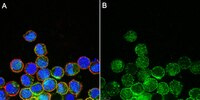MABS2283-25UG Sigma-AldrichAnti-PIP2 Antibody, clone KT10
Anti-PIP2, clone KT10, Cat. No. MABS2283, is a mouse monoclonal antibody that detects phosphatidylinositol 4,5-bisphosphate (PIP2) and is tested for use in ELISA, Flow Cytometry, Immunocytochemistry, and Inhibition Assay.
More>> Anti-PIP2, clone KT10, Cat. No. MABS2283, is a mouse monoclonal antibody that detects phosphatidylinositol 4,5-bisphosphate (PIP2) and is tested for use in ELISA, Flow Cytometry, Immunocytochemistry, and Inhibition Assay. Less<<Recommended Products
Overview
| Replacement Information |
|---|
| References |
|---|
| Product Information | |
|---|---|
| Format | Purified |
| Presentation | Purified mouse monoclonal antibody IgG2a in buffer containing 0.1 M Tris-Glycine (pH 7.4), 150 mM NaCl with 0.05% sodium azide. |
| Quality Level | MQ200 |
| Physicochemical Information |
|---|
| Dimensions |
|---|
| Materials Information |
|---|
| Toxicological Information |
|---|
| Safety Information according to GHS |
|---|
| Safety Information |
|---|
| Storage and Shipping Information | |
|---|---|
| Storage Conditions | Recommended storage: +2°C to +8°C. |
| Packaging Information | |
|---|---|
| Material Size | 25 μg |
| Transport Information |
|---|
| Supplemental Information |
|---|
| Specifications |
|---|
| Global Trade Item Number | |
|---|---|
| Catalog Number | GTIN |
| MABS2283-25UG | 04065268364642 |
Documentation
Anti-PIP2 Antibody, clone KT10 Certificates of Analysis
| Title | Lot Number |
|---|---|
| Anti-PIP2, clone KT10 - Q3875616 | Q3875616 |







